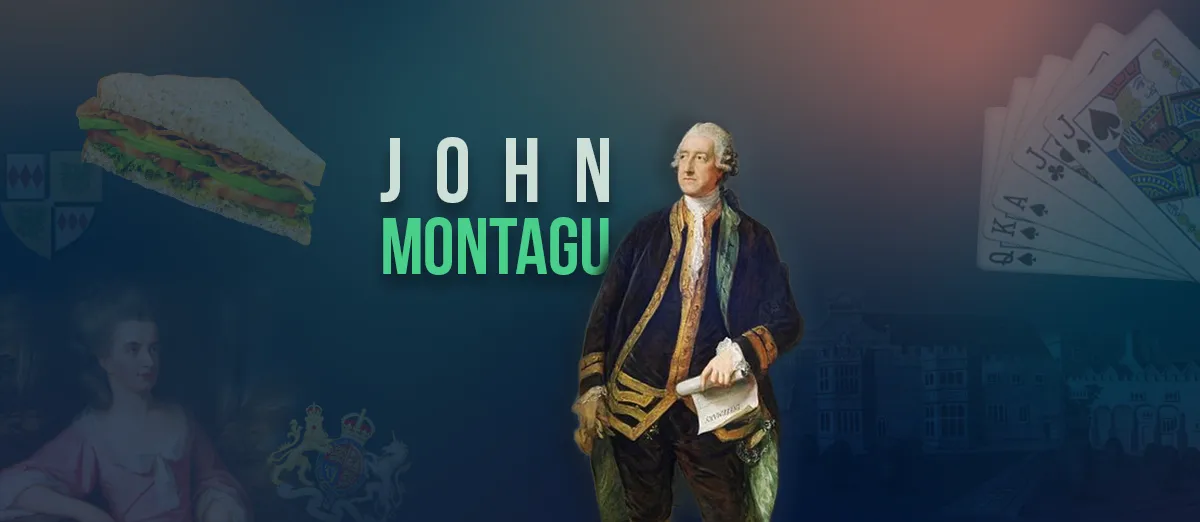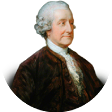The Legacy of John Montagu - The British Gambler Who Invented the Sandwich

This article dives into the intriguing life of John Montagu, the 4th Earl of Sandwich, a historical figure whose legacy extends far beyond the political, gambling, military and culinary realms.
- In this article
- Highlights
- Beginnings
- Career
- John Montagu Net Worth
- Where Is He Today?
- FAQ
Widely known for his unique contribution to our everyday cuisine - the sandwich - John Montagu’s story is a captivating blend of aristocracy, innovation, and high-stakes gambling.
His roles as Postmaster General, First Lord of the Admiralty, and Secretary of State for the Northern Department during the tumultuous American Revolution marked him as a prominent figure in 18th-century politics.
But his reputed sandwich invention has truly immortalized Montagu, not only as a famous gambler and politician, but as a culinary genious. This innovative eating style caught on; his name is forever associated with this culinary convenience.
Aside from his political and gastronomic achievements, Montagu was a popular gambler and a passionate patron of exploration, contributing to his colorful and multifaceted persona.
Stay tuned as we delve deeper into the life and legacy of this enigmatic figure, exploring the John Montagu net worth and his influence are still discussed centuries later.
John Montagu Highlights

- Transformed his home into a den of high-stakes gambling
- Inventor of the most popular dish in modern history – the sandwich
- Popularized eating while gambling
- He sponsored Captain James Cook's voyages, which led to significant discoveries
- Reverred for his legendary gambling spirit
Upbringing and Early Years of John Montagu
John Montagu was born on November 13th, 1718, to Elizabeth Popham and Edward Montagu, Viscount Hichingbrooke.
His formative years were shadowed by his father's early death when he was just four years old. This event set the stage for his succession to his grandfather, who became the fourth Earl of Sandwich at ten.
The young earl’s upbringing was steeped in the elite educational environment of Eton, where he was sent to study shortly after his father’s death.
Montagu’s educational journey continued at Trinity College, Cambridge, a setting that honed his intellectual faculties and expanded his worldview, encouraging a keen interest in politics and governance.
However, his time at Cambridge was cut short as Montagu left to undertake the Grand Tour, a rite of passage for many young aristocrats.
This extensive travel across Continental Europe and into the exotic locales of Greece, Turkey, and Egypt exposed him to various cultures and political landscapes, enriching his perspective and fueling his late interest in Oriental societies.
John Montagu's Political Career and Accomplishments
Upon his return to England in 1739, Montagu took his seat in the House of Lords. He quickly aligned himself with the Patriot Whigs, becoming a vocal critic of the Walpole government.
His opposition was not just vocal; he actively participated in the political debates of the time, particularly against Britain’s military strategies in the War of the Austrian Succession and its support of Hanover.
Montagu argues for a more substantial reliance on naval power, reflecting his later career focus.
His articulate speeches in parliament showcased his ability to present his arguments, establishing him as a significant figure even in his youth.
Montagu’s political career gained significant momentum in 1744 when he was appointed Admiralty Commissioner, serving alongside the Duke of Bedford and the esteemed Admiral Lord Anson.
This trio was integral to the Admiralty’s operations, mainly as Bedford often delegated the day-to-day management to Sandwich and Anson due to his commitments elsewhere.
Under Montagu’s watchful eye, the navy's administration was meticulously handled, focusing on logistical and operational efficiencies that were crucial during a period of maritime conflicts and expansion.
His collaboration with Anson was particularly fruitful, leading to the implementation of Admiral Edward Vernon’s innovative idea of a Western Squadron.
This strategic naval group was a game-changer, enhancing Britain’s naval dominance and contributing directly to the victories in the Battles of Cape Finisterre.
Sandwich expanded his horizons in 1745 when he was commissioned as a colonel and took on a military role in response to the Jacobite rising and looming French treaties.
His leadership extended to forming new army units, demonstrating his versatility and commitment to British defense.
Montagu continued his dual commitment to the navy and the army, eventually rising to the rank of a general. Though he no longer actively participated in military campaigns, his strategic decisions and administrative skills impacted Britain’s military and naval affairs.

“If any man will draw up his case, and put his name at the foot of the first page, I will give him an immediate reply. Where he compels me to turn over the sheet, he must wait my leisure.”
The Dramatic Life of the Gambler and Inventor
Montagu was a prominent political figure and a man whose private life was laden with drama and personal tragedies that could rival any modern-day soap opera.
His romantic involvements and familial relationships were complex and often tumultuous, reflecting the highs and lows of his public endeavors.
For a time, Montagu’s life was intertwined with Fanny Murray, a celebrated beauty of her day, but his heart eventually led him to marry Dorothy Fane. They had a son, John, who would later become the 5th Earl of Sandwich.
However, domestic bliss was short-lived as Dorothy’s health declined into insanity, a situation that deeply affected Montagu.
During his wife’s illness, Montagu sought comfort in the arms of talented singer Martha Ray. Their long-standing affair was fruitful and fraught, producing several children, including Basil Montagu, a noted writer and philanthropist.
However, the relationship was marred by financial difficulties and societal pressure, which culminated tragically when Ray was murdered by a jilted lover, James Hackman, in a shocking incident at the Royal Opera House.
John Montagu's Role of a Gambler Extraordinaire
John Montagu may be best remembered for his namesake culinary creation, but among gamblers, he’s revered for his legendary gambling spirit.
As with most politicians and world leaders with a passion for gambling, his initial foray began during his college years, primarily at the horse races. Montagu was initially cautious, often hesitant to wager larger sums, but his appetite for risk evolved as he matured.
Transitioning from the racetracks to the card table, Montagu fell in love with games of skill and chance. He became an avid player of Euchre, a popular card game at the time, and his home became a hug for high-stakes that lasted into the early hours.
Extreme highs and lows characterized Montagu’s card playing. His gambling was fearless and often reckless, leading to nights when thousands of pounds could be lost or won.
Guests at his card table knew they were in for a long night, likely to end in the morning with their pockets fuller or emptier by a considerable margin.
Montagu’s gambling winnings were sometimes spectacular. On one notable occasion, his success at the card table funded none other than Captain James Cook’s exploratory voyages across the Pacific Ocean.
In gratitude, Cook named the Hawaiian Islands the “Sandwich Islands” in honor of Montagu.
Invention of the Sandwich
The humble sandwich, a staple in diets worldwide, owes its name and origins to John Montagu, the 4th Earl of Sandwich, whose inventive eating solution during long hours at the poker tables has become legendary.
As a fervent gambler, Montagu dislikes interrupting gaming sessions for meals. He conceived a novel idea to sustain himself without leaving the card table: placing slices of salt beef between two pieces of bread.
This creation was not just about convenience; it reflected Montagu’s innovative thinking and practical approach to problems - traits that resonate well with poker players who value strategic foresight and adaptability.
The story goes that during an incredibly intense gambling session, Montagu asked his servants to bring him a concoction so that he could eat with one hand and play cards with the other.
This practice caught on among his peers, who soon began requesting “the same as Sandwich,” giving birth to the term we use so casually today.
Montagu’s idea, however, might have been inspired by his travels across the Mediterranean and Eastern Europe. There, he observed various culinary practices that likely influenced his adaptation of the concept using ingredients more common in England, such as salt beef and wheat bread.
Before long, the sandwich became synonymous with convenient eating, allowing Montagu to dine while gambling.
John Montagu Net Worth and Winnings
John Montagu undoubtedly held considerable wealth. As an Earl and a key figure in British politics and the military, his status alone suggests significant financial stability.
Moreover, Montagu’s indulgence in prolonged gambling sessions, where substantial sums were often at stake, further indicates his financial prowess.
His ability to fund voyages like Captain Cook’s exploration of the Pacific, which famously led to the naming of Sandwich Island, reinforced the narrative of his wealth.
Thus, while exact figures are elusive, it’s clear that John Montagu was among the wealthier echelons of society in his time.
Where Is John Montagu Today?
John Montagu retired from his active public duties in 1782, spending his remaining years in relative tranquility at Hinchingbrooke House, his ancestral home in Huntingdonshire.
His later year allows him some respite from the whirlwind of his political and social engagements.
Montagu passed away on April 20, 1792, leaving a legacy intertwined with British history and culinary innovation.
He was laid to rest in All Saints' Church in Huntingdon, where his tomb remains a site of interest for those fascinated by his contributions to politics, exploration, and, of course, the sandwich's invention.
FAQ
Did John Montagu Invent the Sandwich?
The sandwich is named after John Montagu, the 4th Earl of Sandwich.
Legend has it that he requested meat between two slices of bread during long gambling sessions to eat without interrupting his play, leading to the creation of what we now call the sandwich.
Is John Montagu the 4th Earl of Sandwich?
Yes, John Montagu is the 4th Earl of Sandwich.
Known as a prominent British statesman with roles in the Admiralty and as the Secretary of State for the Northern Department. Aside from his police achievements, and gambling ability, he is famously credited with the invention of the sandwich.
Did John Montagu Have Any Children?
Yes, John Montagu had several children.
With his wife, Dorothy Fane, he had a son named John, Viscount Hinchingbrooke, who later succeeded him as the 5th Earl of Sandwich. He also had other children with his long-term partner, Martha Ray.
Where Was John Montagu Buried?
John Montagu was buried at All Saints' Church in Huntingdon, England.
His final resting place remains a point of historical interest, reflecting his significant impact on British history and culture.





Review this Blog
Leave a Comment
User Comments
comments for The Legacy of John Montagu - The British Gambler Who Invented the Sandwich